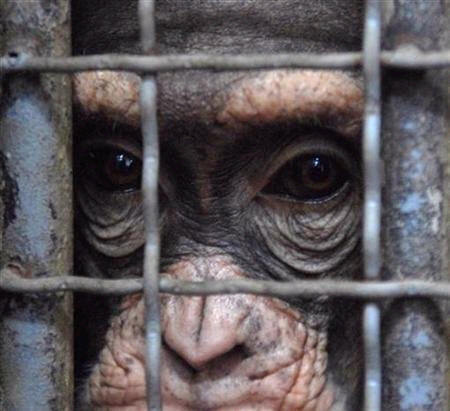(Stillness in the Storm Editor) Is unconsciousness of the individual within social settings a causal factor for the proliferation of injustice, bigotry, prejudice, and wrongdoing? The following article reviews an experiment done with a set of monkeys, suggesting that when individuals fail to think for themselves and blindly follows an order, social trend, or compulsion, untold harm can be wrought on the world.
Morality is a term describing principles of right and wrong, which society today has largely assumed are subjective—what one person believes is right may not be what another thinks. Objective Morality is a term referring to principles of right and wrong that are independent of personal views and whims—based on the objective world and the truth. In this latter sense, a right is an action or choice one person can make that does not harm another—simple enough for a child to understand.
The laws of objective morality are principles of truth that must be lived out or acknowledged in order to affect reality. That is to say, gravity does not require a person to implement an attractive force on an object. But morality requires a person to act in concert with a moral principles in order to be realize the benefits. This requires a mind capable of recognizing the metaphysical realities of consciousness inherent in creation, a product of social dynamics. Only mind can see that committing harm is immoral. And only an active mind is capable of recognizing why behaving morally is beneficial for the self and others. Thus, when one follows an immoral order or a social trend, and mindlessly acts to harm another, they fail to realize their potential of objective morality. In doing so, they reduce the freedom and abilities of all other people—not to mention the damage done to themselves.
The experiment detailed below highlights this principle of morality—laws of the universe that operate in the metaphysical realms of consciousness. As beings evolve and become more aware and conscious, they eventually develop the potential to act morally—which incorporates survival instincts of the past with the socializing features of conscious beings. Morality, in this sense, is those laws of consciousness that—when followed—enhance the coherence or harmony of a social group. The more moral a group of people is, the greater their capacity to work together to achieve their individual and mutual desires—morality is the tool or method for enhancing the freedom of the individual in harmony with others. If everyone acts morality, everyone can achieve their desires. When people don’t act morality, they reduce the freedom of others.
Related Black & White Magic: How do you Manifest your Desires? – Understanding the 2 Modes of Manifestation
Generally speaking, the animal realms of mind are, for the most part, incapable of making a moral choice—dominated by individual survival instincts that make socialization difficult. The animal is chiefly interested in survival and procreation. Only higher order animals—or those dominated by hive mind attributes, like ants—are capable of selfless action for the greater good of the whole species. Thus, in the main, morality is an emergent property of social beings that process a capacity for empathy (emotional intelligence) and rational thought (intellectual intelligence).
While human beings have the potential to act morally, realizing this potential requires an activated consciousness, else a person succumbs to their animalistic nature, which is implicitly selfish. Animal mind is focused on survival and when faced with a choice to sacrifice the self for the good of the collective, lower order animals will almost always choose personal survival. On the other hand, human orders of consciousness can recognize the value of self sacrifice, but this requires the capacity to empathize. Furthermore, only a conscious person capable of thinking independently of the crowd or heard can muster the courage to go against the social order and make a greater moral choice. Once done, this higher choice can proliferate into the social order and enhance the morality of the species.
Sadly, due to mass mind control and social programming, in addition to a population enamored by distractions of all sorts, people have become mostly unconscious and immoral. People, at present, tend to follow the orders of so-called authorities or the social trends of culture, committing harmful actions towards their fellows without a second thought, and usually without understanding why.
In short, when people fail to develop their mind and empathetic capacities, they effectively act like animals and are incapable of realizing their desires in harmony with all other beings. They become shallow, egocentric, narcissistic, sociopathic and selfish, often ignoring the hardship of others to suit their own ends. Such individuals prove themselves to be untrustworthy and incapable of working with their fellows honorably because social contracts or agreements require trust. And when large populations of society act with selfish immorality, the potential of the whole species and community is greatly hindered. Enormous amounts of energy are needed just to maintain a semblance of order—all because the people have failed to master their consciousness and the potential or moral action inherent in the human order of life.
The less moral people become, the less freedom is enjoyed by all in society due to the slow destruction of common or public trust. Thus, the more that people become conscious, the more likely they are to become moral and the more freedom is gained by all as a result.
To the unconscious person, the idea that becoming more moral imparts more freedom seems absurd. But as morality increases, social coherence improves, and the restrictions of the whole social order are lessened because each person is more responsible and trustworthy. Eventually, if morality approaches levels of ultimacy, the individual becomes more skilled at realizing their desires without causing harm to others, enhancing social trust so that cooperation in all respects improves. The peak of such a society is a utopia where external restrictions on the individual—we know of as legal policies—disappear because each person exercises self-control implicitly. In the current social climate, such a utopia seems inconceivable—and it is due to lack of trust. But anyone who takes the time to contemplate the principles of morality and the mechanics of social systems can easily see the merit in the premise of morality and social coherence.
The solution to the world’s current plague of immorality, and the resulting need to oppress people with draconian legal policies, is to raise the consciousness of all people so that they begin to act in concert with objective morality. The more fully and completely all people are elevated and supported so as to become wise and responsible, the more empowered, free, and uplifted the whole of society will be.
by John Stepper, October 26th, 2013
 My first introduction to him was a video of his TED talk on “Smart failure for a fast-changing world”. This week at JiveWorld, he gave the keynote speech. With passion and some unorthodox presentation techniques, he walked us a through a range of practical insights about human beings and ways to change behavior. Everyone loved it.
My first introduction to him was a video of his TED talk on “Smart failure for a fast-changing world”. This week at JiveWorld, he gave the keynote speech. With passion and some unorthodox presentation techniques, he walked us a through a range of practical insights about human beings and ways to change behavior. Everyone loved it.The Five Monkeys Experiment
Monkeys at work
Now what? A modern lesson
_________________________
Stillness in the Storm Editor’s note: Did you find a spelling error or grammar mistake? Do you think this article needs a correction or update? Or do you just have some feedback? Send us an email at [email protected]. Thank you for reading.




Leave a Reply